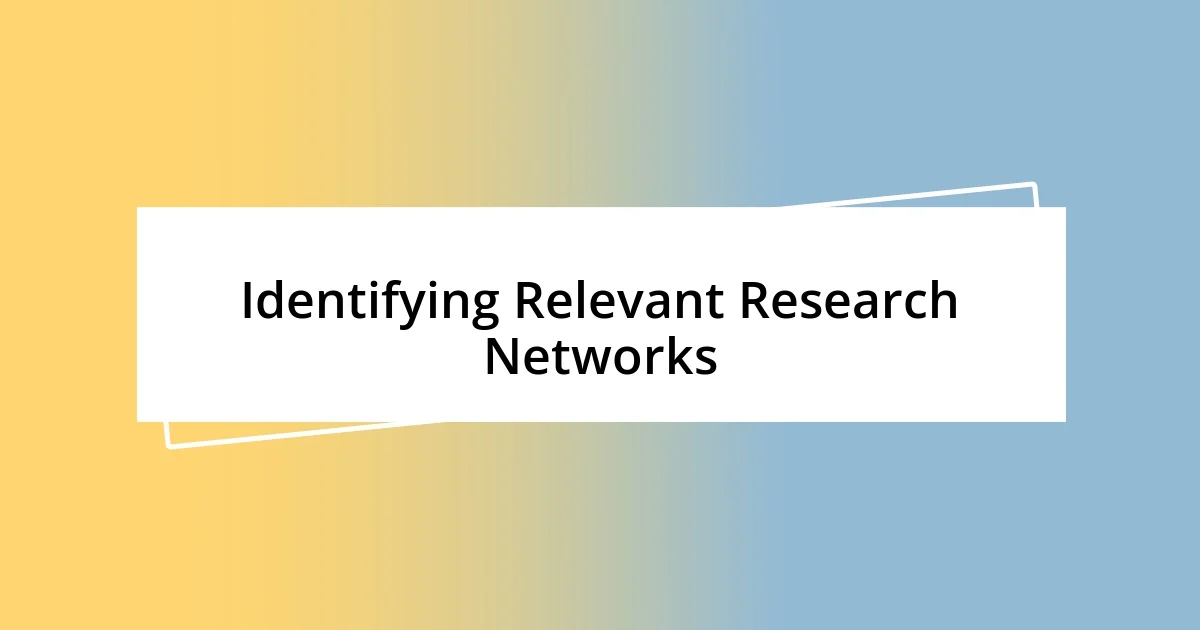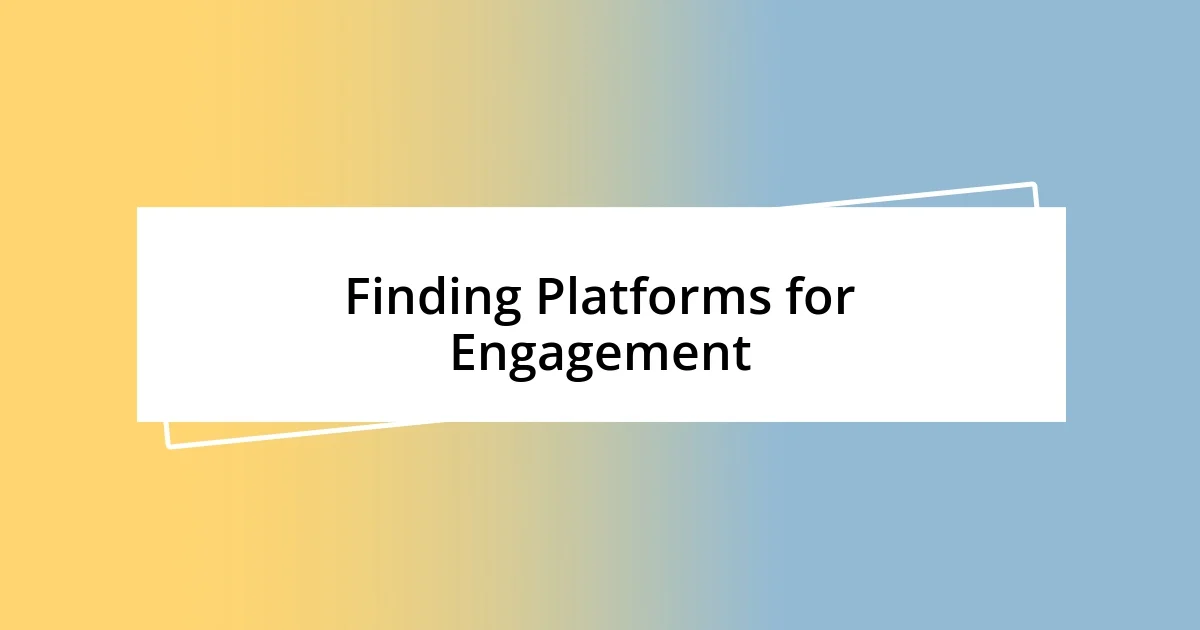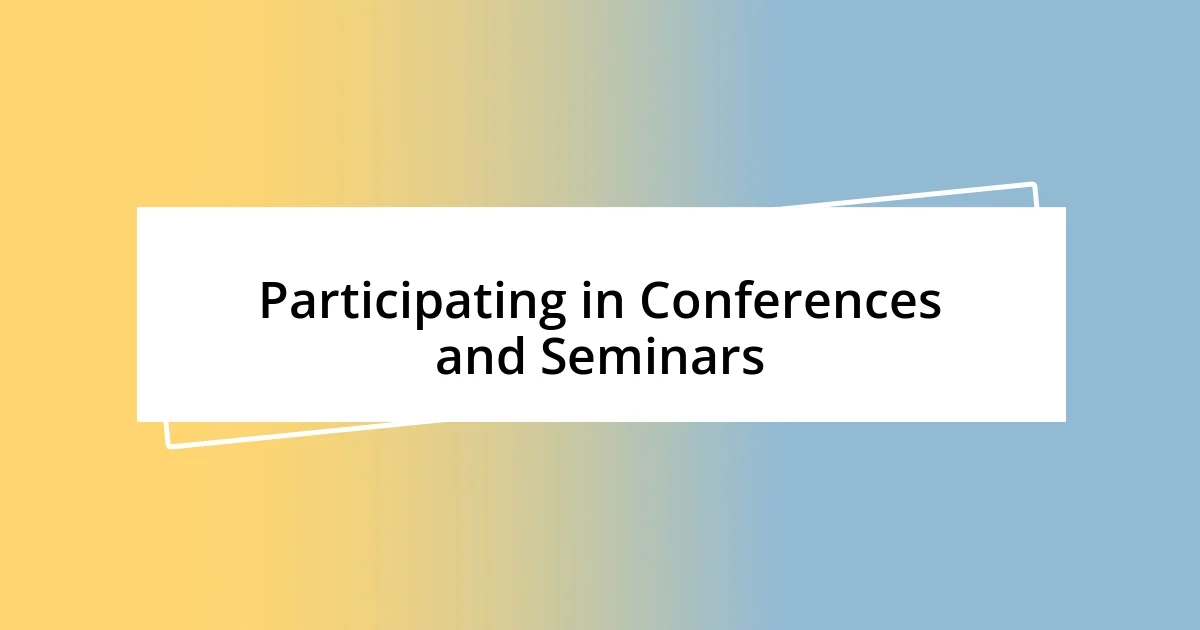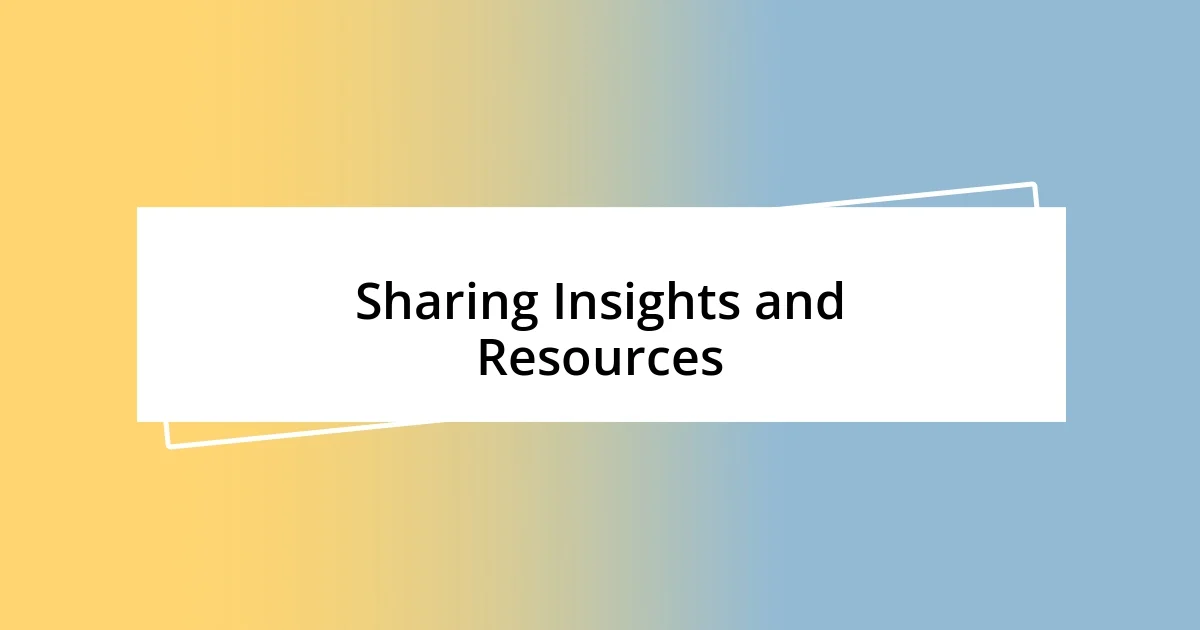Key takeaways:
- Engaging with scholarly communities fosters collaboration, inspiration, and a sense of belonging, enhancing academic identity.
- Identifying relevant research networks and finding suitable platforms for engagement, including conferences and social media, significantly enriches scholarly experiences.
- Building genuine relationships and sharing insights in collaborative settings leads to transformative learning and innovative breakthroughs in research.

Understanding Scholarly Communities
Scholarly communities are fascinating ecosystems where ideas flourish and knowledge is shared. For me, joining such a community felt like stepping into a vibrant conversation that I had longed to be a part of. I often wonder, what can be more enriching than engaging in discussions with like-minded individuals who are equally passionate about research and discovery?
I remember my first experience at a scholarly conference; it was a breathtaking moment. I found myself surrounded by researchers dedicated to the same field, exchanging thoughts that sparked inspiration and curiosity. This connection extends beyond individual contributions; it’s a collaborative spirit that fosters collective growth and insight. Can you imagine the potential of sharing your work with others who truly understand its nuances?
Ultimately, understanding these communities means recognizing their role in shaping academic identity. They offer a sense of belonging and validation that can be hard to find elsewhere. As I immersed myself in discussions, I realized that every member carries unique experiences and perspectives, contributing to a rich tapestry of knowledge. It left me pondering: how has your engagement with scholarly communities shaped your own understanding of your field?

Identifying Relevant Research Networks
Identifying relevant research networks is crucial for meaningful engagement in scholarly communities. I vividly remember the moment I stumbled upon a network that perfectly aligned with my research interests. It felt like a light bulb turning on; finding a group that not only shared my focus but also offered diverse viewpoints was exhilarating. This realization reinforced the importance of actively seeking out networks that resonate with your scholarly pursuits.
Here are some key strategies to identify these relevant research networks:
-
Explore Academic Journals: Investigate where your favorite authors publish their work. This often leads to discovering specialized networks or organizations.
-
Attend Conferences: Participate in events related to your field. I often found valuable connections in informal discussions over coffee or during poster sessions.
-
Leverage Social Media: Platforms like Twitter and LinkedIn can be goldmines for finding scholars and groups that align with your interests.
-
Join Professional Associations: Many disciplines have associations that serve as hubs for networking; these have been invaluable in my own journey.
-
Utilize University Resources: Don’t hesitate to reach out to your institution’s library or research office; they can guide you to specific networks that you might not have considered.
By consciously applying these strategies, you can significantly enhance your chances of connecting with the right research communities that inspire and elevate your work.

Finding Platforms for Engagement
Finding the right platforms for engagement can truly transform your scholarly journey. I remember the thrill of discovering a niche online forum where researchers discussed cutting-edge findings in my field. The first time I posted a question, I was met with a flurry of responses from people I had never met but who shared similar thoughts and challenges. That sense of community, even in a virtual space, motivated me to contribute my insights and further solidified my commitment to collaboration.
Another memorable experience was joining a local book club focused on research literature. It was a casual setting, yet the discussions delved deep. Sharing my views with fellow academics while sipping coffee felt both relaxing and invigorating. I came to appreciate that platforms for engagement don’t have to be formal; they can be as simple as an informal meetup or a dedicated group on social media. It’s these unexpected spaces where I found inspiration and a renewed passion for my work.
While online platforms are abundant, finding the right fit can still be daunting. That’s why I take my time exploring different options, from webinars to specialized listservs. I question, “Where do I feel most comfortable expressing my thoughts?” Engaging in spaces that resonate with me has made all the difference in my scholarly experience.
| Platform | Type of Engagement |
|---|---|
| Online Forums | Informal discussions, Q&A sessions with peers. |
| Local Research Book Clubs | Deep discussions in a relaxed environment, sharing diverse perspectives. |
| Social Media Groups | Instant connections and real-time conversations on trending topics. |
| Conferences | Networking and face-to-face exchanges, opportunities for collaboration. |

Building Relationships with Scholars
Building relationships with scholars is not just about exchanging contact information; it’s about cultivating genuine connections. I recall attending a workshop where I was intimidated by the expertise of my fellow participants. But as the day progressed, I found comfort in overhearing their candid discussions about setbacks in their research. I took the brave step to join in, sharing my own challenges. That simple act of vulnerability opened the door to deeper conversations, and suddenly, we were no longer strangers but collaborators supporting one another’s journeys.
In my experience, follow-up is key to nurturing these newfound relationships. After meeting someone at a conference, I made it a point to send a quick email, recalling our discussion on a specific topic. To my delight, it resulted in an exchange of resources and eventually a collaborative project. This taught me that showing genuine interest in someone’s work can lead to fruitful partnerships. Have you ever considered how a simple follow-up could transform a brief encounter into a lasting collaboration?
Moreover, I’ve learned that attending social events related to my field can be just as valuable as formal gatherings. On one occasion, I joined a casual meet-up where the atmosphere was relaxed and open. I found myself engaging more deeply with a scholar whose work I admired. Sharing stories over drinks instead of in a stuffy conference room led to spontaneous brainstorming sessions that sparked new ideas for both of us. It reinforces my belief that relationships thrive in spaces where people feel at ease to express themselves. So, when’s the last time you simply connected with someone in a relaxed setting? Those moments can lead to the most significant professional growth.

Participating in Conferences and Seminars
Participating in conferences and seminars has been a game-changer for my academic journey. I still vividly remember my first major conference—the excitement and anxiety swirling within me as I stepped into the bustling venue. Networking felt daunting, but when I struck up a conversation with someone over coffee, it turned into an engaging discussion about our research interests. That moment underscored how networking can blossom from simple interactions. It makes me wonder, have you experienced similar serendipitous connections at conferences?
During one seminar, I attended a panel discussion that resonated deeply with my own research. Afterward, I approached one of the panelists, nervously introducing myself and expressing my appreciation for their insights. To my surprise, they invited me to join a project they were working on, showcasing how proactive engagement can lead to incredible opportunities. This taught me the value of stepping out of my comfort zone and forging connections that are rooted in shared interests.
The atmosphere at these events is electric—filled with enthusiasm and the excitement of new ideas. I often make it a point to attend informal gatherings at conferences, like the after-hours mixers. These relaxed settings encourage open dialogue and collaboration, and I’ve found some of my most enriching exchanges happen in those unstructured moments. Have you taken advantage of these opportunities to connect on a more personal level? It’s in those moments that I’ve gained insights and friendships that endure well beyond the conference itself.

Contributing to Collaborative Research
Contributing to collaborative research is truly a fulfilling experience. I remember being part of a research group focused on climate change, which opened my eyes to the power of diverse perspectives. Each member brought unique insights gleaned from their specialized fields, which led to unexpected breakthroughs in our project. Have you ever participated in a collective effort that exceeded your individual expectations? I can assure you, those moments of synergy are incredibly rewarding.
One instance stands out vividly. While collaborating on a paper, we set up a weekly virtual meeting. Initially, I was skeptical about how effective remote communication could be, but watching our ideas grow in real time was exhilarating. When someone shared a particularly compelling article, the discussion that followed sparked ideas that shaped our work significantly. I truly believe that collaboration thrives on shared learning experiences like these. Have you considered what innovative ideas might emerge from your own group discussions?
Reflecting on my contributions, I realize that writing together enhances not only the work but also the camaraderie among researchers. With every collaborative writing session, we gained confidence in each other’s strengths, leading to an atmosphere where creativity flourished. I often think back to one late-night brainstorming session, where laughter and sheer inspiration flowed freely, resulting in sections of the paper that felt both powerful and authentic. Doesn’t it feel fantastic when the energy in a room—or a virtual space—transforms a task into something enjoyable? That’s the magic of collaborative research.

Sharing Insights and Resources
Sharing insights with others in scholarly communities has enriched my perspective in unimaginable ways. I remember a moment during a discussion board where I uploaded a resource I found invaluable—an open-access journal article that synthesized years of research on educational approaches. The conversation that followed was illuminating. My peers shared their interpretations, raised questions, and even suggested additional readings I had never considered. This experience reinforced the idea that sharing isn’t just about disseminating information; it’s about sparking dialogue and exploring diverse angles together.
I also value the resources shared in my professional networks. One time, a colleague introduced me to a fantastic online repository of data sets that enhanced my project significantly. I was astonished by how one simple link can lead to a cascade of new ideas, encouraging creativity and deeper analysis in our work. Have you ever stumbled upon a resource that reshaped your thinking? Sharing those eureka moments not only bridges gaps in knowledge but also cultivates a culture of support within our scholarly circles.
During my journey, I’ve discovered that sharing insights is an avenue for mentorship as well. I volunteered to host a webinar where I discussed strategies I had developed for effective literature reviews. The feedback was heartwarming; participants expressed gratitude for the clarity and actionable advice. It made me realize that every piece of knowledge has the potential to empower someone else. Have you thought about how your expertise could benefit others in the community? By generously sharing insights and resources, we create an interconnected web of learning that strengthens our collective scholarship.














